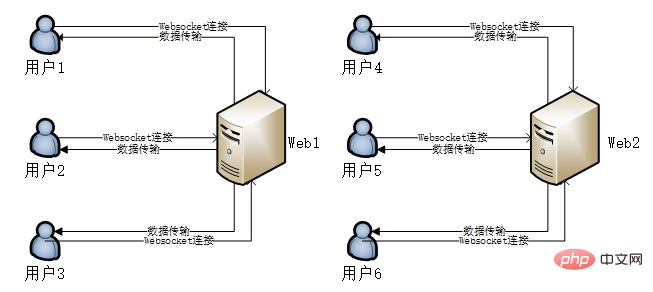What are the application scenarios for using swoole in PHP?
php The application scenarios for using swoole are: 1. Collect positioning data in real time and output it in real time. All positioning devices need to be received in real time and the real-time track records are displayed on the map; 2. Only positioning devices are collected. To store, the data uploaded by all positioning devices needs to be stored in the database.

php The application scenarios for using swoole are:
Scenario 1 - Real-time collection of positioning data and real-time output (Example Didi driver’s driving trajectory)
Instructions:
It is necessary to receive all positioning devices in real time and display the real-time trajectory records on the map
Note:
The first point:
Web1 server is connected to users 1, 2, 3. When web1 broadcasts information, it can only broadcast users 1, 2, 3. Users 4, 5, and 6 who cannot broadcast web2 connections. Assume that the scene is chatting. User 1 sends a message. Only users of the web1 server can see it. All users of web2 cannot receive it.
Second point: Message Frequency control, for example: 100 devices, 100 users, 100 devices upload one piece of data per second, which needs to be broadcast to each user in real time, that is, 100*100 = 1W times per second, so the data per second can be summarized and broadcast to All users and other methods

Scenario 2 - Only collect positioning devices into the database
Instructions: All positioning devices need to be uploaded The data is stored in the database, with 7 devices and one piece of data per second. I personally use swoole's task function (deliver an asynchronous task to the task_worker pool. This function is non-blocking and the number of worker processes can also be configured) and then calls the interface to store it in the database.
Server memory alarm problem
Cause: swoole_server->task Function
Officially introduces that the bottom layer of task uses Unix Socket pipe communication, which is full memory Yes, there is no IO consumption. The read and write performance of a single process can reach 1 million/s. Different processes use different pipelines to communicate, which can maximize the use of multiple cores.
But if the task is to call the program interface, due to network delay, when the added tasks are larger than the consumed tasks, the memory usage will continue to increase, causing the server's memory to be full.
Solution: Control the frequency of messages entering the task. You can define this time and whether it can be delayed according to your own business scenario, summarize all the data within 1 second and then call the program interface (I personally use redis when summarizing ), it is best to store it directly in the database without calling the interface
Simple code snippet
function __construct($config)
{
$this->config = $config;
$this->serv = new Swoole\Server($config['server']['host'], $config['server']['port']);
// 连接redis
$this->redis = new Predis\Client($config['redis']);
$this->storage = new Storage($this->config);
$this->serv->set([
'worker_num' => $this->config['server']['workerNum'], //工作进程数量
'daemonize' => $this->config['server']['daemonize'], //是否作为守护进程
'task_worker_num' => $this->config['server']['taskWorkerNum'],
]);
$this->serv->on('connect', function ($serv, $fd){
$this->onConnect($fd, $serv);
});
$this->serv->on('receive', function ($serv, $fd, $from_id, $data) {
$this->onReceive($fd, $serv, $data);
});
$this->serv->on('Close', function($server, $fd) {
$this->onClose($fd, $server);
});
$this->serv->on('Task', function($server, $task_id, $from_id, $data) {
$this->onTask($server, $task_id, $from_id, $data);
});
$this->serv->on('Finish', function($server, $task_id, $data) {
$this->onFinish($server, $task_id, $data);
});
$this->serv->start();
}
public function onTask($serv, $task_id, $from_id, $data){
// insert 方法是通过接口入库
$this->storage->insert($data);
}
public function onReceive($fd, $serv, $data)
{
$this->storage->writeLog('message:'.$data);
$data = $this->formatData($data, $fd);
$serv->task($data);
}
public function onClose($fd, $serv)
{
// writeLog 方法是写入log
$this->storage->writeLog('close fd:'.$fd);
}
public function onFinish($serv, $task_id, $data)
{
return '';
}Related learning recommendations:PHP programming from entry to proficiency
The above is the detailed content of What are the application scenarios for using swoole in PHP?. For more information, please follow other related articles on the PHP Chinese website!

Hot AI Tools

Undresser.AI Undress
AI-powered app for creating realistic nude photos

AI Clothes Remover
Online AI tool for removing clothes from photos.

Undress AI Tool
Undress images for free

Clothoff.io
AI clothes remover

AI Hentai Generator
Generate AI Hentai for free.

Hot Article

Hot Tools

Notepad++7.3.1
Easy-to-use and free code editor

SublimeText3 Chinese version
Chinese version, very easy to use

Zend Studio 13.0.1
Powerful PHP integrated development environment

Dreamweaver CS6
Visual web development tools

SublimeText3 Mac version
God-level code editing software (SublimeText3)

Hot Topics
 1376
1376
 52
52
 PHP 8.4 Installation and Upgrade guide for Ubuntu and Debian
Dec 24, 2024 pm 04:42 PM
PHP 8.4 Installation and Upgrade guide for Ubuntu and Debian
Dec 24, 2024 pm 04:42 PM
PHP 8.4 brings several new features, security improvements, and performance improvements with healthy amounts of feature deprecations and removals. This guide explains how to install PHP 8.4 or upgrade to PHP 8.4 on Ubuntu, Debian, or their derivati
 CakePHP Date and Time
Sep 10, 2024 pm 05:27 PM
CakePHP Date and Time
Sep 10, 2024 pm 05:27 PM
To work with date and time in cakephp4, we are going to make use of the available FrozenTime class.
 CakePHP File upload
Sep 10, 2024 pm 05:27 PM
CakePHP File upload
Sep 10, 2024 pm 05:27 PM
To work on file upload we are going to use the form helper. Here, is an example for file upload.
 Discuss CakePHP
Sep 10, 2024 pm 05:28 PM
Discuss CakePHP
Sep 10, 2024 pm 05:28 PM
CakePHP is an open-source framework for PHP. It is intended to make developing, deploying and maintaining applications much easier. CakePHP is based on a MVC-like architecture that is both powerful and easy to grasp. Models, Views, and Controllers gu
 CakePHP Creating Validators
Sep 10, 2024 pm 05:26 PM
CakePHP Creating Validators
Sep 10, 2024 pm 05:26 PM
Validator can be created by adding the following two lines in the controller.
 How To Set Up Visual Studio Code (VS Code) for PHP Development
Dec 20, 2024 am 11:31 AM
How To Set Up Visual Studio Code (VS Code) for PHP Development
Dec 20, 2024 am 11:31 AM
Visual Studio Code, also known as VS Code, is a free source code editor — or integrated development environment (IDE) — available for all major operating systems. With a large collection of extensions for many programming languages, VS Code can be c
 CakePHP Quick Guide
Sep 10, 2024 pm 05:27 PM
CakePHP Quick Guide
Sep 10, 2024 pm 05:27 PM
CakePHP is an open source MVC framework. It makes developing, deploying and maintaining applications much easier. CakePHP has a number of libraries to reduce the overload of most common tasks.
 How do you parse and process HTML/XML in PHP?
Feb 07, 2025 am 11:57 AM
How do you parse and process HTML/XML in PHP?
Feb 07, 2025 am 11:57 AM
This tutorial demonstrates how to efficiently process XML documents using PHP. XML (eXtensible Markup Language) is a versatile text-based markup language designed for both human readability and machine parsing. It's commonly used for data storage an




